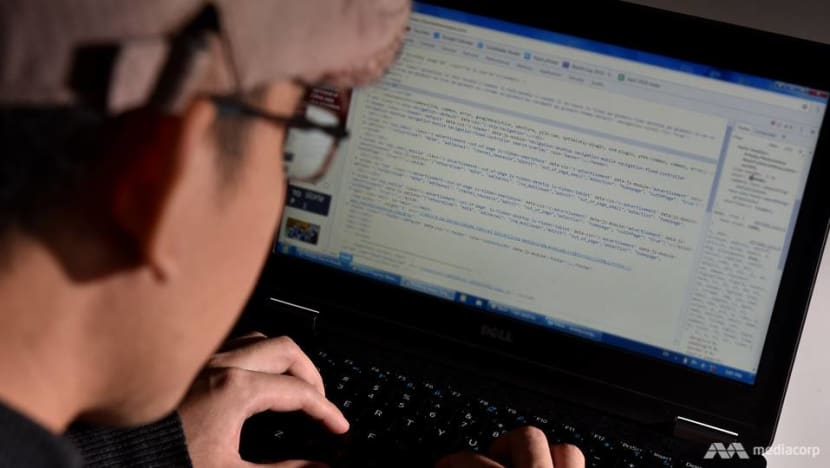Parents can help steer youth away from online radicalisation

A man using a laptop. (File photo: Jeremy Long)
SINGAPORE: While online influences may lead young people towards self-radicalisation, it is their offline relationships with the people around them that can best counter the dangerous sway, say observers.
These include their parents and guardians, as well as teachers, who can engage with them and get them to think critically when confronted with extremist ideologies.
This comes after the Internal Security Department announced on Wednesday that it had detained a 16-year-old Singaporean boy who had made plans to attack two mosques here on Mar 15, the second anniversary of New Zealand's Christchurch attacks.
The teenager - a Protestant Christian of Indian ethnicity - is the youngest person to be dealt with under the Internal Security Act (ISA) for terrorism-related activities.
Minister for Law and Home Affairs K. Shanmugam told reporters that since 2015, seven people under the age of 20 have been arrested under the ISA after getting radicalised online.
Of the seven, four were detained while three were served with restriction orders.
READ: 16-year-old Singaporean detained under ISA after planning to attack Muslims at 2 mosques
“Young people are at a stage in their developmental life course where they experience transitions biologically, psychologically and socially. During this stage, there is a greater willingness to challenge frameworks handed to them by parents and other authority figures,” said Institute of Policy Studies senior research fellow Mathew Mathews.
With fewer familial and social responsibilities, there is also a greater concern with perceived injustices and a willingness to engage with causes, said Dr Mathews.
“Youths might be more vulnerable to extremist ideologies, since these often tap onto the perceived injustices which they are concerned about and the belief of wanting to do something that counts,” he said.
“Extremist groups may also appear to aid in developing the youth’s beliefs and identities, while warping them in reality and preying on their desire for community,” said Tracie Lazaroo, a clinical psychologist from Inner Light Psychological Services and LP Clinic.
“Extremists may also seek to abuse the hopelessness and resentment in the youth by providing them seemingly staunch senses of duty, purpose and direction; weaponising them without their knowledge,” she added.
READ: The Big Read: Open to extremist views, youth want diverse voices and honest talk — but at what cost?
The 16-year-old Singaporean was influenced by Australian Brenton Tarrant - who killed 51 people and injured 40 after opening fire on worshippers at two mosques in Christchurch in 2019 - and is the first ISA detainee to be influenced by what has been described as far-right extremist ideology.
“There are hardly any local experiences that young people can have in Singapore which would predispose them to embrace right-wing extremism,” said Dr Mathews.
“But with youth plugged in to global realities interfaced through online media, what may be of concern elsewhere in the world may resonate with them,” he said.
READ: Commentary: Why Asia may not be immune to far-right terrorism
WHAT CAN BE DONE?
It is “really hard to say” what the best way of preventing such self-radicalisation is, said Paul Hedges, associate professor in interreligious studies at the S Rajaratnam School of International Studies (RSIS), noting the varying profiles of individuals who have gone down that route.
He noted though there are several actions that must be taken.
“One, obviously, is the monitoring and blocking of content that may lead to radicalisation, and this is for politicians, social media platforms, et cetera to do,” he said.
“But also, in the offline space, education, parents, politicians, religious groups need to socialise people into ways of life that seek to break down binaries of us versus them and stigmatisation of particular groups,” he added.
Besides prejudiced statements or changes in personality, one thing that parents can look out for is if their children spend many hours alone on computers or mobile devices, Dr Hedges said.
"This may be gaming, pornography, gambling or other things, but in any case may well be problematic as addictions to these can arise," he said.
National University of Singapore sociologist Tan Ern Ser said adults should check themselves to ensure they do not “knowingly or unknowingly transmit their own ethnic or religious prejudices to their children or those under their care”.
Dr Lazaroo said that signs that parents and guardians should look for are changes in character and secretive behaviour, as well as passive expressions of hate and prejudice towards specific populations.
READ: 'It was not my time yet': Malaysian survivor recounts horrific Christchurch mosque shooting
She cautioned however against rushing to judgement, saying young people could become withdrawn at a “vulnerable and crucial moment”.
“Approaching the conversation from a stance of clarification and understanding will help keep an open dialogue far better than immediate fear and anger,” she said.
Parents should actively engage with their children, asking about their friends and interests and encouraging them to participate in “positive and inclusive activities”.
“Extremists attempt to isolate subordinates from alternative perspectives, so it may be beneficial to explain that individuals who do so may not have their best interests at heart,” she said.
Dr Lazaroo also called on parents and guardians to facilitate an atmosphere of critical thinking for their charges when it comes to information sources, to give them a more complete and objective understanding of current events.
They should also help their children explore avenues of getting their voices heard and championing change in a “conducive and safe manner”, rather than turning to violence, she said.
“When parents seek to be in the lives of their children and can have open conversations with them about what they are reading and thinking, it provides many more opportunities to detect if their children are gravitating towards radical beliefs,” said Dr Mathews.














